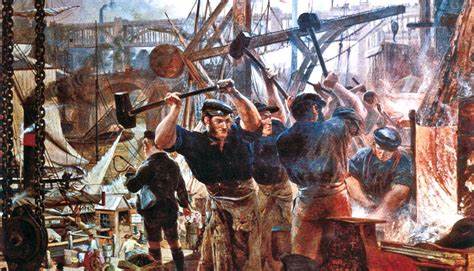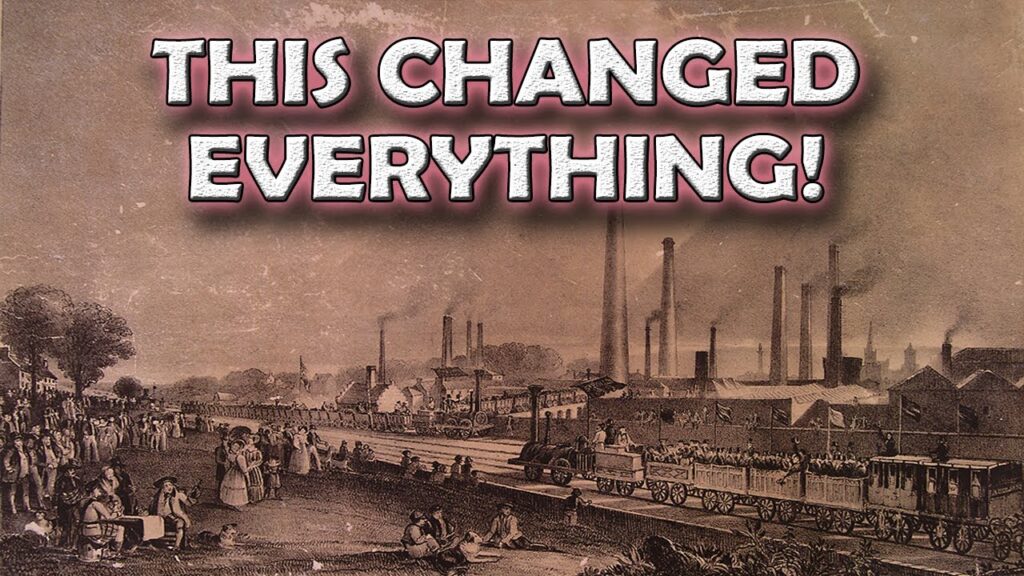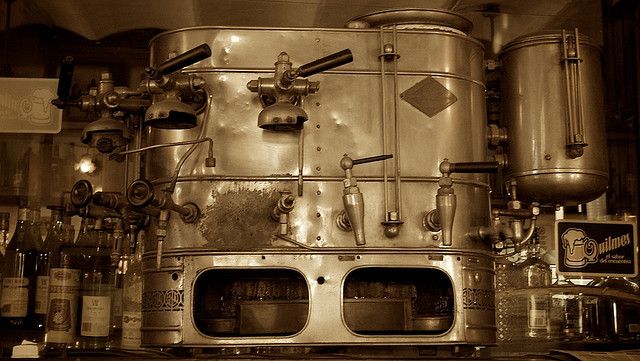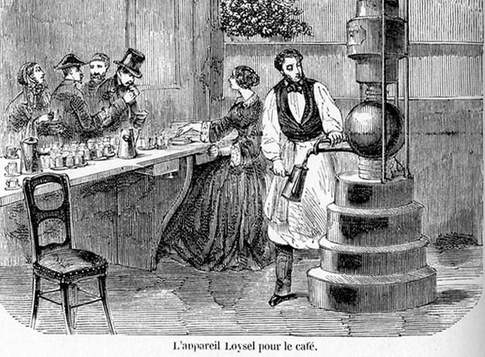The Introduction of Coffee and Boiled Water:
Catalysts for the Industrial Revolution.
The Industrial Revolution came to be due to the coffee health benefits and its introduction as a popular drink replacing the then standard drink of wine or beer. A period of profound socio-economic and technological transformation was made possible because people were not drunk at work all day and creativity blossomed marking a massive turning point in human history. It brought about significant advancements in manufacturing, agriculture, and transportation that led to unprecedented economic growth.
This was truly a period of profound socio-economic and technological transformation, marked a turning monumental point in human history. It brought about significant advancements in manufacturing, agriculture, and transportation that led to unprecedented economic growth as well as the health advancements with coffee health benefits overriding the drunken population prior.

While there were numerous factors that contributed to the Industrial Revolution, this blog explores the intriguing connection between the introduction of coffee and boiled water and how it directly impacted the industrial revolution. We will discuss the productivity, and societal progress created by this seemingly small change in human habits that changed the world forever.
Wine from Morning to Night for even the Children!
Prior to the importation of coffee in the mid 1700’s the boiling of water was rare and the understanding it would kill the diseases hiding in the water was yet to be understood. The common practice of all the population including children was to drink wine from morning to night. Wine and alcohol were safer than the water that made everyone sick at the time.
The introduction of coffee by providing an alternative to water consumption and promoting mental well-being, these innovations played a crucial role in shaping the conditions necessary for the Industrial Revolution to thrive.
The What Where and Why of Coffees Benefits.
Unsafe Water Supply and the Rise of Alternative Beverages: During the pre-industrial era, access to clean drinking water was a significant challenge. Contaminated water sources were prevalent, leading to the spread of diseases and poor overall health. In this context, people sought alternatives to quench their thirst and sustain their energy levels. One of the most notable beverages to gain popularity was coffee, introduced from the Middle East and Africa. Coffeehouses emerged as social hubs, facilitating intellectual discussions and promoting a culture of innovation.
A Catalyst for Mental Health and Productivity:
A catalyst for mental health and productivity: Coffee’s stimulating properties offered individuals a newfound mental alertness and focus. Caffeine, a natural stimulant present in coffee, enhances cognitive functions and reduces fatigue, thereby increasing productivity and concentration. By enabling longer work hours, coffee allowed individuals to engage in more labour-intensive activities, making significant contributions to economic growth and technological advancements during the Industrial Revolution.
Boiled Water and the Mitigation of Waterborne Diseases.
The practice of boiling water for consumption was another vital development during this period. Boiling water effectively killed bacteria and parasites, reducing the prevalence of waterborne diseases such as cholera and typhoid. This simple yet transformative technique made clean drinking water accessible to a broader population. By reducing illness and mortality rates, boiled water created a healthier workforce, leading to enhanced productivity and economic prosperity.
The Social and Economic Impact of Improved Health.
Improved access to clean drinking water and the consumption of coffee had wide-ranging social and economic implications. With reduced waterborne diseases, individuals experienced improved overall health, leading to increased life expectancy and population growth. This demographic shift fuelled labour supply, creating a larger workforce available for industrial activities.
Coffeehouses as Intellectual and Innovation Hubs.
Coffeehouses emerged as vibrant social spaces where people the coffee health benefits impacted many and various backgrounds congregated to exchange ideas and engage in intellectual discovery. These establishments fostered a culture of learning and innovation, enabling the spread of knowledge and the cross-pollination of ideas. The diverse intellectual atmosphere of coffeehouses played a pivotal role in disseminating new concepts, technologies, and entrepreneurial spirit, all of which were instrumental in driving the Industrial Revolution forward.
The Role of Coffeehouses in Revolutionary Societal Transformations.
Coffeehouses were more than just places to consume beverages; they served as centres for intellectual enlightenment and societal progress. By providing a gathering place for scientists, philosophers, artists, and businessmen, coffeehouses catalysed the formation of intellectual networks and collaborations. This exchange of ideas and knowledge acted as a catalyst for the industrial, scientific, and cultural advancements that characterized the Industrial Revolution.


Brewing Coffee During the Industrial Revolution: An Evolutionary Journey.
The Industrial Revolution, spanning from the late 18th to mid-19th century, brought about significant advancements in technology and transformed various aspects of daily life. One area that experienced notable changes during this period was the brewing of coffee. This essay explores the evolution of coffee brewing methods throughout the Industrial Revolution, highlighting the impact of technological advancements, social changes, and the rise of mass production on the preparation of this beloved beverage.
The Early Industrial Revolution and the Coffeehouse Culture: Prior to the Industrial Revolution, coffeehouses served as vital social and intellectual hubs. Coffee brewing was typically done manually, using rudimentary techniques. Beans were roasted in small quantities over open fires and then ground by hand using pestles and mortars. Boiling water was poured over the ground coffee, and the mixture was left to steep before being strained through cloth or a fine sieve. Although labour-intensive, this method prevailed as the primary means of coffee brewing in the early stages of the Industrial Revolution.
Technological Advancements and the Rise of Industrial Coffee Brewing: As the Industrial Revolution progressed, significant technological innovations emerged, transforming the process of coffee brewing. The invention of the steam engine, the spread of mass production techniques, and the introduction of new manufacturing materials all played a role in revolutionizing the coffee brewing industry.
- Industrial Roasting: The development of industrial-scale roasting machines allowed for larger batches of coffee beans to be roasted simultaneously. These machines utilized steam power and revolving drums, resulting in more consistent and efficient roasting processes.
- Grinding and Pulverizing: The industrial revolution witnessed the introduction of mechanical coffee grinders, replacing manual grinding methods. These machines, powered by steam or water, enabled the rapid grinding of coffee beans into a fine powder, reducing the time and effort required for this step.
- Brewing Innovations: Brewing methods also experienced significant advancements. One notable development was the introduction of percolators and coffee urns. Percolators used steam or boiling water to circulate through a filter containing coffee grounds, producing a consistent and easily repeatable brewing process. Coffee urns, capable of brewing large volumes of coffee at once, became a common sight in factories and workplaces.
Social Changes and the Expansion of Coffee Consumption: The Industrial Revolution not only transformed coffee brewing techniques but also impacted the social dynamics surrounding coffee consumption. The growth of urban centres and the rise of factory labour created a demand for quick and accessible sources of caffeine. Coffee became a staple beverage among workers, providing the energy necessary to sustain long hours and demanding tasks.
- Coffee on the Go: As industrial workers required coffee on the move, portable brewing devices gained popularity. Vacuum brewers, for example, allowed individuals to carry pre-prepared coffee and heat it when needed, catering to the fast-paced lifestyle of the era.
- Coffeehouses and Cafés: While the coffeehouse culture of the pre-industrial era began to decline, coffeehouses and cafés adapted to the changing times. These establishments increasingly focused on efficiency and catering to the needs of workers. They incorporated larger brewing equipment and efficient service models to meet the demand for coffee on a mass scale.
The Industrial Revolution brought remarkable changes to the brewing of coffee. Technological innovations in roasting, grinding, and brewing processes, alongside social shifts and the rise of mass production, transformed coffee brewing from a labour-intensive task into a streamlined and efficient process. These advancements catered to the needs of the expanding industrial workforce, enabling the consumption of coffee on a large scale. The legacy of the Industrial Revolution’s impact on coffee brewing methods can still be observed in today’s modern coffee industry, which continues to build upon the foundation laid during this transformative period.
Conclusion:
The introduction of coffee as a popular alternative to unsafe drinking water and the widespread adoption of boiling water as a hygiene practice were two interrelated developments that significantly impacted the Industrial Revolution. Coffee’s stimulating properties enhanced mental alertness and productivity, while boiled water mitigated waterborne diseases, resulting in a healthier and more productive workforce.
Furthermore, coffeehouses emerged as social and intellectual hubs, fostering the exchange of ideas and facilitating innovation. Together, these advancements created an environment conducive to economic growth, technological breakthroughs, and societal progress, propelling the world into the transformative era of the Industrial Revolution.
Author.
Brendon McAliece is a multi-lingual-expat who brings over three decades of flight simulator/PC building experience as well as over two decades of real world jet fighter experience as a weapons/egress technician. He holds a sport pilot certificate giving him real world flying experience. Hi travels have taken him from Europe to the Middle East, Asia and his home of Australia. He has a passion for travel, languages, Flight simulation as well as Guitaring and Coffee. You can read more in his blogs below.

Learn more @
DreamingGuitar.com – DreamingCoffee.com – LetsFlyVFR.com
Home – Blog – Shop – About
As an Amazon affiliate I may earn on qualifying sales.








